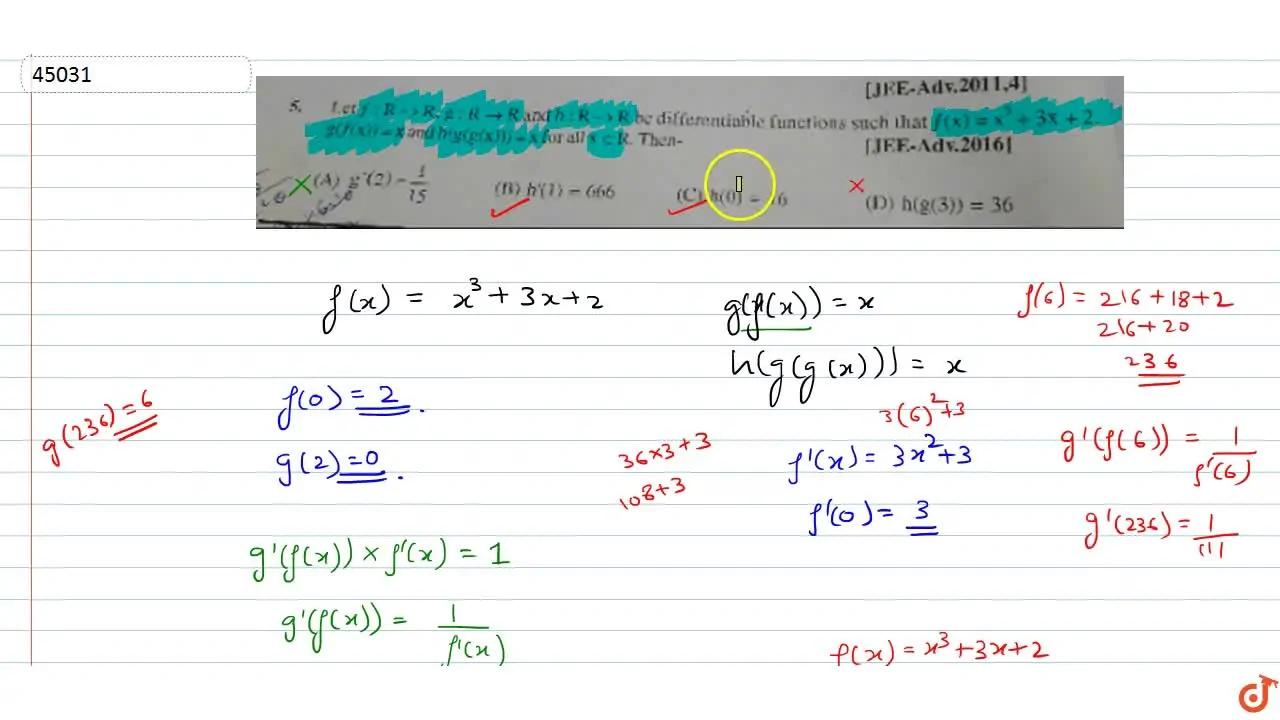Let f:R→R,g:R→Randh:R→R be the differential functions such that f(x)=x3+3x+2,g(f(x))=xandh(g(g(x)))=x,forallx∈R.Then (a)g'(2)=115 (b)h'(1)=666 (c)h(0)=16 (d)h(g(3))=36
g'(2)=115
h'(1)=666
h(0)=16
h(g(3))=36
The correct Answer is:B, C
As, g(f(x))=x
Thus,g(x) is invorse of f (x).
⇒ g(f(x))=x
⇒ g'(f(x))⋅f'(x)=1
∴ g'(f(x))=1f'(x) ……(i)
[where, f'(x)=3x2+3]
When f(x)=2, then
x3+3x+2=2
⇒ x=0
i.e. when x = 0, then f(x) = 2
∴ g'(f(x))−13x2+3at (0,2)
⇒ g'(2)=13
∴ Option (a) is incorrect.
Now, h(g(g(x)))=x
⇒ h(g(g(f(x))))=f(x)
⇒ h(g(x))=f(x) ....(ii)
As g(f(x))=x
∴ h(g(3))=f(3)=33+3(3)+2=38
∴ Option (d) is incorrect.
From Eq. (ii), h(g(x))=f(x)
⇒ h(g(f(x)))=f(f(x))
⇒ h(x)=f(f(x)) (iii)
[using g(f(x)) = x]
⇒ h'(x)=f'(f(x))⋅f'(x) ...(iv)
Putting x = 1, we get
h'(1)=f'(f(1))⋅f'(1)=(3×36+3)×(6)
=111×6=666
∴ Option (b) is correct.
Putting x=0 in Eq. (iii), we get
h(0)=f(f(0))=f(2)=8+6+2=16
∴ Option (c ) is correct.
Related Playlists
- BOOK - IIT JEE PREVIOUS YEARCHAPTER - LIMIT,CONTINUITY AND DIFFERENTIABILITY EXERCISE - Differentiability at a point ( Assertion and Reason)1videos
LIMIT,CONTINUITY AND DIFFERENTIABILITY
- BOOK - IIT JEE PREVIOUS YEARCHAPTER - LIMIT,CONTINUITY AND DIFFERENTIABILITY EXERCISE - Differentiability at a point (Match the Columns)2videos
LIMIT,CONTINUITY AND DIFFERENTIABILITY
- BOOK - IIT JEE PREVIOUS YEARCHAPTER - LIMIT,CONTINUITY AND DIFFERENTIABILITY EXERCISE - Differentiability at a point ( Objective Questions I)25videos
LIMIT,CONTINUITY AND DIFFERENTIABILITY
- BOOK - IIT JEE PREVIOUS YEARCHAPTER - JEE MAINSEXERCISE - All Questions1videos
JEE MAINS
- BOOK - IIT JEE PREVIOUS YEARCHAPTER - MATRICES AND DETERMINANTSEXERCISE - SOLVING SYSTEM OF EQUATIONS (INTEGER ANSWER TYPE QUESTION)2videos
MATRICES AND DETERMINANTS
Similar Questions
Let f:R→R and h:R→R be differentiable functions such that f(x)=x3+3x+2,g(f(x))=xandh(g(g(x)))=x for all x∈R. Then, h'(1) equals.
View SolutionLet f:R→Randg:R→R be differentiable functions such that f(x)=x3+3x+2,g(f(x))=xfor all x∈R, Then, g'(2)=
View SolutionLet f:R→R,g:R→R be two functions such that
f(x)=2x−3,g(x)=x3+5 The function (fog)−1(x) is equal toView SolutionLet f:R→R and g:R→R be two functions such that fog(x)=sinx2andgof(x)=sin2x Then, find f(x)andg(x).
View SolutionLet f:R→R and g:R→R be given by f(x)=3x2+2andg(x)=3x−1 for all x→R. Then,
View SolutionLet f:R→R , g:R→R be two functions defined by f(x)=x2+x+1 and g(x)=1−x2 . Write fog (−2) .
View SolutionIf f:R→R,g:R→Randh:R→R is such that f(x)=x2,g(x)=tanxandh(x)=logx then the value of [ho(gof)]x, if x=√π2 will be
View SolutionIf f:R→R , g:R→R be two given functions then h(x) = 2 min {f (x) - g(x), 0} equals
View SolutionIf f:R→Randg:R→R are two given functions, then prove that 2min.{f(x)−g(x),0}=f(x)−g(x)−|g(x)−f(x)|
View SolutionLet f and g be differentiable functions on R such that g(1)=3=g'(1) and f'(4)=118−π .If h(x)=f(3xg(x)+sin(πx)−5) then h'(1) is equal to
View Solution


